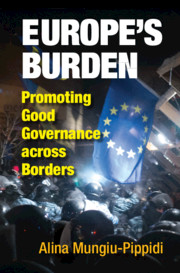Crossref Citations
This Book has been
cited by the following publications. This list is generated based on data provided by Crossref.
Batory, Agnes
2021.
A free lunch from the EU? Public perceptions of corruption in cohesion policy expenditure in post-communist EU member states.
Journal of European Integration,
Vol. 43,
Issue. 6,
p.
651.
Kiss, Tamás
and
Székely, István Gergő
2022.
Populism on the Semi-Periphery: Some Considerations for Understanding the Anti-Corruption Discourse in Romania.
Problems of Post-Communism,
Vol. 69,
Issue. 6,
p.
514.
Soyaltin-Colella, Digdem
and
Cihangir-Tetik, Damla
2022.
EU Good Governance Promotion in the Age of Democratic Decline.
p.
181.
Soyaltin-Colella, Digdem
2022.
EU Good Governance Promotion in the Age of Democratic Decline.
p.
1.
Dipama, Samiratou
2022.
EU Good Governance Promotion in the Age of Democratic Decline.
p.
133.
Zhou, Qingjie
Du, Mingyue
and
Ren, Siyu
2022.
How Government Corruption and Market Segmentation Affect Green Total Factor Energy Efficiency in the Post-COVID-19 Era: Evidence From China.
Frontiers in Energy Research,
Vol. 10,
Issue. ,
Volintiru, Clara
Profiroiu, Alina-Georgiana
and
Mina-Raiu, Laura
2023.
Cross-Driven Institutional Resilience.
p.
243.
Mutascu, Mihai
2024.
European Union funds and corruption in the ex-communist member states.
Journal of Contemporary European Studies,
Vol. 32,
Issue. 2,
p.
555.



